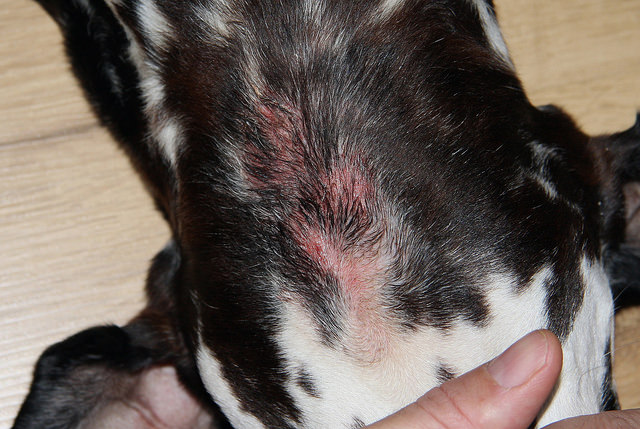In my practice, I see large breed dogs every day. Dogs come in so many sizes that I thought I would explore the top 5 reasons that large breed dogs see me. All large breed dogs can probably trace back to a handful of similar ancient breeds, so there are definitely genetic predispositions in large and giant breeds. Some of the problems simply are made more likely by the size of the patient.
#1 – Ear Infections
Otitis Externa is very common in any size dog, but Golden Retrievers and a few other large breeds seem to have a genetic issue with infected ears. Many of the cases are related to inhalant allergies or atopy (also thought to be genetic). Atopy is an allergy to things that your dog can breathe in, like pollens or molds. Owners report that a patient with otitis externa is shaking his head or whining when the owner rubs his ears. Some owners notice a smelly discharge from the ears. Normal ears do not itch all the time and never stink. You need your vet to look and make sure that the ear drum is intact. He or she will probably recommend a culture to find out exactly what is growing in the ears or at least a cytology (looking at the discharge under a microscope) to get an idea how best to treat.

#2 – Skin disease
I think that people notice skin disease the most because, well… you can SEE the skin. But because of the prevalence of allergic skin disease, metabolic abnormalities, insect stings and infections, a lot of dogs come to see me with missing hair. If you notice spots of hair missing whether or not your dog is scratching or licking, see your vet. I treat large dogs like Labrador Retrievers with missing hair from hot spots (See Ask A Vet: What Is A “Hot Spot” & What Can I Do About It?) and English Bulldogs with flank alopecia and skin fold pyoderma. Each breed has its own tendencies, but certainly not exclusivity. Skin disease is a prevalent problem in any size dog, but there are always a share of dogs over 60 pounds with skin disease on my appointment calendar.
#3 – Traumatic Injury
Big dogs are active and busy. I see them for injuries frequently. They seem to experience sprains and strains more than small dogs. Penetrating wounds from stepping on things like nails and even escaping and getting hit by cars are common complaints. Any dog with a sudden rear limb lameness should see a vet to rule out cruciate injury, especially large breeds. The cruciate ligament helps to stabilize the knee of dogs and if it is damaged, the knee will be unstable and the dog very lame. Maybe the pervasiveness of the injuries is because bigger dogs can escape fences or maybe it’s because many of them have such a strong drive to chase balls or catch frisbees, but large dogs seem to sustain a larger number of injuries than other dogs. There are as many things that can injure a big dog as there are big dogs and everyone who has one has probably experienced an injury at some time. If your dog is not bearing weight normally on a limb or has an obvious wound, it is time to see your vet.

#4 – Osteoarthritis
Large breed dogs often have osteoarthritis as they age. Such dogs may or may not be limping or showing stiffness, but it may be because they are so active and get injured frequently that they eventually experience the inflammation associated with joint wear and dysfunction. Their weight puts more pressure on their joint as they age and makes the likelihood of arthritis greater. Don’t assume that your dog is just slowing down because of aging. We have many options for restoring quality of life. Make sure your large or giant breed dog is never overweight which increase his likelihood and severity of this rampant disorder.
#5 – Cancer
Cancer is a sad specter that rears its ugly head in my animal hospital. Large breed dogs seem to be overrepresented for certain types of neoplasia, like osteosarcoma and hemangiosarcoma. It might be because large breed dogs do not have quite as long of a life expectancy that we see it earlier in life for them. These dogs will be limping, losing weight or just not seeming like themselves. If you have a large breed dog (especially if she is a senior), make sure you have regular screenings at your vet. Certain cancers are very painful and measures will have to be taken to prevent suffering. Sometimes knowing the cancer is there will allow a surgery or treatment that will cure the disease or delay its progression. Knowledge is power so find out if your dog is at risk.
Just because these things are common does not mean that you can manage them at home. All of these things are common reasons that I see large dogs. If you think that your dog may have one of these (or any issue that isn’t quite right), let your vet help.
Please find me on on Twitter, Facebook or Google+. I love hearing about your pets!
